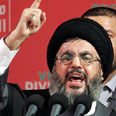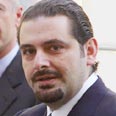
Nasrallah. Could he be prime minister?
Photo: AP

Saad al-Hariri: Nasrallah a challenge
Photo: AFP
Will Hizbullah state arise in Lebanon?
Following war in Lebanon there are growing differences of opinion within Shiite community in southern Lebanon. Radical faction demands establishment of Shiite sharia state in south and Lebanon Valley. Moderates, on other hand, will make do with release of prisoners and evacuation of Shebaa Farms
A month and a half after the war in Lebanon and the intense atmosphere amongst our northern neighbors isn't subsiding. Even if the picture of the situation Lebanon isn't entirely clear, one thing is for certain – the ground is burning under their feet. It has always been clear that something is happening on the other side of the border during the war, even though Hizbullah TV network al-Manar didn't show it. But as time goes on, rumors are starting to slip out.
The newspaper al-Watan al-Arabi gave a special spot in an article published this week to the turmoil within the Shiite community and the Hizbullah leadership. According to the report, with the end of the fighting and Hizbullah's agreement to UN Security Council Resolution 1701, anger has grown within the Shiite community.
Desperation?
Moshe Elad
Hizbullah chief working on deal: Abducted soldiers in exchange for immunity
Many have started wondering out loud what they got out of the war. Within the community in Lebanon there is an increasing sense that they are the ones that paid the price of the war, but didn't benefit from it.
Because of this, disagreements among the Shiites have intensified, all the way up to the Hizbullah leadership. The radical faction of the community is demanding the establishment of a Shiite sharia state in the south and the Lebanon Valley.
The more moderate faction is demanding that after the set objectives (read: 'liberation of Shebaa Farms' and release of the Lebanese prisoners) are achieved, the organization must disarm and absorb into the Lebanese state in exchange for increased Shiite representation according to the formula of factional representation.
On the background of such internal controversies, the aggressive speech of Hizbullah Secretary-General Hassan Nasrallah last Friday can be understood. Many view the speech as a challenge to the Lebanese regime. In any case, within Hizbullah there is a sense that conditions have been created for changing the situation and establishing facts. The question: Where to go from here? Over this there is an argument.
The newspaper also reported that various Shiite communities in the Persian Gulf have transferred messages to the Hizbullah leadership, including calls for the organization to moderate its messages, that the aggressive declarations against Lebanon and the Arab world endanger the fate of Shiites in other countries, like Kuwait and Bahrain.
On top of the growing discord within the Shiite community, there are also political tensions already existing in Lebanon. Chairman of the parliament majority and the head of the anti-Syrian camp in Lebanon, Saad al-Hariri, interpreted Nasrallah's speech as a challenge to the exiting order in Lebanon.
In a speech given in response, al-Hariri warned against attempts to topple the Lebanese government. He mocked the Nasrallah's declarations of victory saying that Lebanon is suffering from "immense hardship."
"The occupation increased the scope of the disaster and enlarged the number of prisoners," he said.
'Israel and the US provided arms for Hizbullah's opponents'
A spokesman in the US State Department responsible for the war on terror said that Hizbullah is threatening to topple the Lebanese government, and believes that they have the power to do so.
The situation indeed seems tense. Qatari newspaper al-Watan took it one step further in a report published Saturday quoting Syrian sources that Lebanon is standing before another civil war. According to the report, a number of groups have received large amounts of weapons and equipment from Israeli, American, and western sources. Reportedly, the weapons were sent in preparation for a new stage in Lebanon after Hizbullah disarms.
The weapons, according to the report, went to anti-Hizbullah militias, such as those in al-Hariri's camp, Druze leader Walid Junblatt, and the Christian Phalangists, lead by Samir Jaja.















